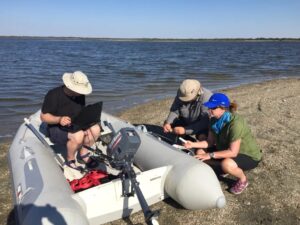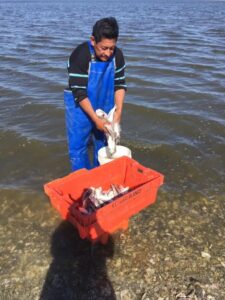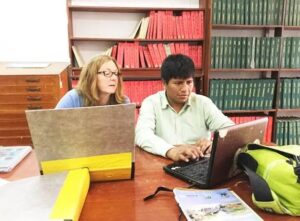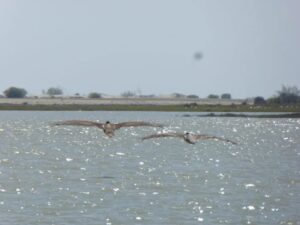Nina Laurie: Opportunity Explorer
A background
Nina Laurie is a Professor in the School of Geography and Sustainable Development. When asked if she would agree to be interviewed for this blog, she welcomed us with open arms, flapjacks, and keychains from Peru. Filled with stories from trips that have changed her outlook on her research, she has in the past focused on gender and development in Nepal and Bolivia with the aim of enhancing the North-South dialogue. Soon after, she begins to narrate the story of what led her to initiate her current project on the El Niño phenomenon.
“I was in Peru for a holiday, visiting my friend who ran an old people’s home in the mountains. Most old people were abandoned there, which is a common occurrence given the effects of migration. We’d go on picnics every Wednesday to birdwatch and when I was looking through my binoculars a friend showed me a glacier, which had shrunk so much since the last time I saw it, I was shocked! An Indigenous woman passing by stopped and looked through the binoculars as well, and she was shocked because of how large the glacier seemed. That’s when it hit. A switch clicked in my mind, and I realised that I’d just been looking at climate change from a Western perspective. It fundamentally shifted what I wanted to do with the rest of my career.”
El Niño: A phenomenon of opportunities
Initiated by Laurie in 2014 with funding from the AHRC, the team from St Andrews has been conducting research in the Sechura region of Peru. The group discovered that the phenomenon of El Niño was often misunderstood as solely a disaster, due to the way it impacts regions including the USA and Canada. In some contexts like the Sechura desert, however, El Niño can also be considered a phenomenon of opportunity as rains and flooding also lead to the formation of large temporary lagoons. Consequentially, the team developed a website to showcase this wider view of El Niño, in collaboration with research colleagues, government officials, educators and NGOs such as PRISMA in Peru. PRISMA and the St Andrews-based team continued to explore how locals were taking advantage of this phenomenon and set out to engage the wider public by collaborating with the local museum, as well as creating teaching resources which will focus on inter-generational learning.
Whilst this plan was created in 2019, the pandemic hindered its progress and Laurie and her team needed to adapt. A grant from the Global Challenge Research Fund (GCRF) allowed them to continue their work remotely. Initially, Laurie and the research team were planning to conduct interviews focused on generational learning about how families historically adapted to the El Niño phenomenon. They shifted the curriculum online and re-directed travel budgets to purchase computer tablets instead, with WhatsApp and Zoom pre-installed to allow children access to online materials. These tools also empowered children to continue their education despite the pandemic-caused adversities.
Impact through lifework
Laurie and the team have now developed teaching resources, in both English and Spanish, which can be accessed online. The team also hosted a workshop and collaborated with heritage actors and the museum, creating content on resilience in the heritage sector and archaeological sites. These videos were given to the local municipality and were later publicised, which has led to increased visitor numbers to the museum in the Archaeological site of Chusis.
“PRISMA have taught me to always record everything. With permission, of course. Like, getting the school children to use videos for their oral history was an extension in part of what they always do. It’s a tool for communication, and it is so valuable.”




Now Laurie is focussed on promoting dialogue between a diversity of communities and stakeholders by organising intellectual exchange. She is part of the Pedagogies Research Cluster in the School of Geography and Sustainable Development, which she jointly leads with Dr Vanessa Schofield, supported by a Steering Group bringing different areas of expertise. This group helped organise a series of events in Scotland and London, with colleagues from PRISMA when they visited St Andrews as part of the on-going collaboration earlier this year. Their conversations and seminars centred around the role of heritage and education in promoting sustainable development in climate-change sensitive settings such as Peru. The had discussions with individuals from various schools at the University, including Dr Paula Miles from the School of Psychology and Neuroscience, and Dr Bede Williams and Ellen Thomson from the Music Centre SGSD as well as with Grace Healy from the University of Oxford. The conversation focused on how the pandemic affected students’ return to in-person teaching around the world. PRISMA colleagues explained how the positive relationship developed by the Peruvian students with the project helped them weather the pandemic; they were the cohort who were most looking forward to returning to school. These pedagogic findings were picked up further in Peruvian-Scottish Exchange meetings with the education committee of the Royal Scottish Geographical Society which showcased the teaching resource developed by the team and hosted by the Royal Geographical Society, which they are aiming to align with the Scottish Curriculum for Excellence.
Next Steps
Laurie hopes to monitor the project’s progress and assess its impact. She believes this can be achieved by placing great emphasis on the children involved in the project, observing whether they partake in community leadership roles or if they continue to create accessible resources about their own understanding of the El Niño phenomenon. The ongoing work in this project has also branched into new directions, with a focus on heritage and music. The study will delve into the world of local songs from maritime communities, understanding their unique meanings and what they tell us about the relationships between different fishing villages. Laurie hopes to understand how these communities use various methods to preserve their heritage, which will add to the existing wealth of literature in ethno-musicology and cultural heritage.
“Working with children and with PRISMA has fundamentally changed the way I view research. I want to look into my archives, like when I did stuff on soup kitchens, and try to find the people I originally interviewed or even their children. I want to write about food sovereignty and encourage intergenerational conversations. Maybe even write a book one day. It’s all very exciting.”
Laurie’s work continues to find new directions, as demonstrated by her recent preaching in St Salvadors Chapel, in a talk titled ‘El Niño cometh’. The PRISMA St Andrews team have also been recently published in the Scottish Geographical Journal on their collaborative process and its outcomes. Their education-based work has also been published via the Geoforum.
Check out the latest #OpenAccess article Bell, I., Laurie, N., Calle, O., Carmen, M., & Valdez, A. (2024). Education for disaster resilience: lessons from El Niño. Geoforum: https://doi.org/10.1016/j.geoforum.2023.103919

